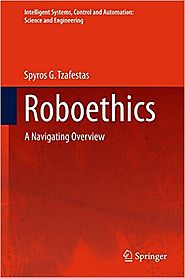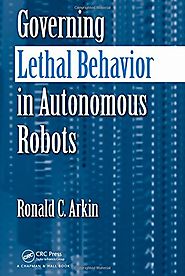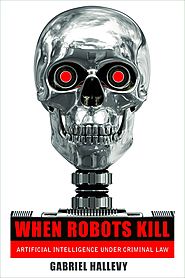-
About
- About Listly
- Community & Support
- Howto
- Chrome Extension
- Bookmarklet
- WordPress Plugin
- Listly Premium
- Privacy
- Terms
- DMCA Copyright
- © 2010-2025 Boomy Labs


 Kunihiro Maeda
Kunihiro Maeda
Listly by Kunihiro Maeda

This volume explores the ethical questions that arise in the development, creation and use of robots that are capable of semiautonomous or autonomous decision making and human-like action. It examines how ethical and moral theories can and must be applied to address the complex and critical issues of the application of these intelligent robots in society.
Coverage first presents fundamental concepts and provides a general overview of ethics, artificial intelligence and robotics. Next, the book studies all principal ethical applications of robots, namely medical, assistive, socialized and war roboethics. It looks at such issues as robotic surgery, children-robot and elderly-robot therapeutical/social interactions and the use of robots, especially autonomous lethal ones, in warfare. In addition, a chapter also considers Japanese roboethics as well as key intercultural and robot legislation issues.
Overall, readers are provided with a thorough investigation into the moral responsibility (if any) of autonomous robots when doing harm. This volume will serve as an ideal educational source in engineering and robotics courses as well as an introductory reference for researchers in the field.

Expounding on the results of the author’s work with the US Army Research Office, DARPA, the Office of Naval Research, and various defense industry contractors, Governing Lethal Behavior in Autonomous Robots explores how to produce an "artificial conscience" in a new class of robots, humane-oids, which are robots that can potentially perform more ethically than humans in the battlefield. The author examines the philosophical basis, motivation, theory, and design recommendations for the implementation of an ethical control and reasoning system in autonomous robot systems, taking into account the Laws of War and Rules of Engagement.
The book presents robot architectural design recommendations for
Post facto suppression of unethical behavior,
Behavioral design that incorporates ethical constraints from the onset,
The use of affective functions as an adaptive component in the event of unethical action, and
A mechanism that identifies and advises operators regarding their ultimate responsibility for the deployment of autonomous systems.
It also examines why soldiers fail in battle regarding ethical decisions; discusses the opinions of the public, researchers, policymakers, and military personnel on the use of lethality by autonomous systems; provides examples that illustrate autonomous systems’ ethical use of force; and includes relevant Laws of War.
Helping ensure that warfare is conducted justly with the advent of autonomous robots, this book shows that the first steps toward creating robots that not only conform to international law but outperform human soldiers in their ethical capacity are within reach in the future. It supplies the motivation, philosophy, formalisms, representational requirements, architectural design criteria, recommendations, and test scenarios to design and construct an autonomous robotic system capable of ethically using lethal force.
Ron Arkin was quoted in a November 2010 New York Times article about robots in the military.

The growing use of artificial intelligence (AI) software and robots in the commercial, industrial, military, medical, and personal spheres has triggered a broad conversation about human relationships with these entities. There is a deep and common concern in modern society about AI technology and the ability of existing social and legal arrangements to cope with it. What are the legal ramifications if an AI software program or robotic entity causes harm? Although AI and robotics are making their way into everyday modern life, there is little comprehensive analysis about assessing liability for robots, machines, or software that exercise varying degrees of autonomy.
Gabriel Hallevy develops a general and legally sophisticated theory of the criminal liability for AI and robotics that covers the manufacturer, programmer, user, and all other entities involved. Identifying and selecting analogous principles from existing criminal law, Hallevy proposes specific ways of thinking through criminal liability for a diverse array of autonomous technologies in a diverse set of circumstances.

A timely book that uses science fiction to provoke reflection and discussion on philosophical issues
From the nature of mind to the ethics of AI and neural enhancement, science fiction thought experiments fire the philosophical imagination, encouraging us to think outside of the box about classic philosophical problems and even to envision new ones. Science Fiction and Philosophy explores puzzles about virtual reality, transhumanism, whether time travel is possible, the nature of artificial intelligence, and topics in neuroethics, among other timely issues. This thought-provoking volume is suitable for students and general readers but also examines new and more advanced topics of interest to seasoned philosophers and scientists.
Susan Schneider (Hometown TK) is Assistant Professor in the department of philosophy at the University of Pennsylvania and an Affiliated Faculty Member at the Institutes for Research in Cognitive Science and Center for Cognitive Neuroscience.
